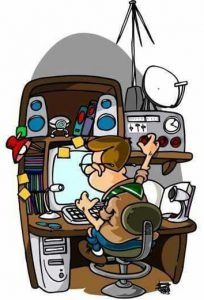License & Tests
Become an Amateur Radio Operator – “Ham”

*An amateur radio operator is an individual who uses equipment at an amateur radio station to engage in two-way personal communications with other similar individuals, on radio frequencies assigned to the amateur radio service by the government. Amateur radio operators are trained, tested, and licensed, and must demonstrate adequate technical and legal knowledge of radio regulations. They are allowed to transmit on any frequency within small frequency bands, using a variety of modes, such as voice, text, image, and data.
They may also communicate via satellite or the Internet. Amateur radio operators come from all walks of life and have a purely personal aim and without pecuniary interest. They are often referred to as ‘ham’ radio operators. They can function even when other means of communication have failed and form a volunteer backbone communication system in case of disasters.
Before you can get on the air, you need to be licensed and know the rules to operate legally. US licenses are good for 10 years before renewal and anyone may hold one except a representative of a foreign government.
The Technician class license is the entry-level license of choice for most new ham radio operators. To earn the Technician license requires passing one examination totaling 35 questions on radio theory, regulations and operating practices. The license gives access to all Amateur Radio frequencies above 30 megahertz, allowing these licensees the ability to communicate locally and most often within North America. It also allows for some limited privileges on the HF (also called “short wave”) bands used for international communications.
A General License is the second of three US Amateur Radio licenses. To upgrade to General Class, you must already hold a Technician Class license (or have recently passed the Technician license exam). Upgrading to a General license–which conveys extensive HF privileges—only requires passing a written examination. Once you do, the entire range of operating modes and the majority of the amateur spectrum below 30 MHz become available to you. The FCC grants exam Element 3 credit to individuals that previously held certain older types of licenses.
General or Advanced licensees may upgrade to Extra Class by passing a 50-question multiple-choice examination. No Morse code test is required. In addition to some of the more obscure regulations, the test covers specialized operating practices, advanced electronics theory and radio equipment design. Non-licensed individuals must pass Element 2, Element 3 and Element 4 written exams to earn an Extra License. The FCC grants exam element 3 credit to individuals that previously held certain older types of licenses. Extra Class Licenses are authorized to operate on all frequencies allocated to the Amateur Service.
* Information obtained from the ARRL website. To find out more about obtaining a license, please visit the ARRL website.

VEC Testing
FCC created the VEC system to provide initial licensing examinations for prospective new hams and upgrade examination opportunities for those already licensed. FCC authorized VEC organizations oversee the work of their certified Volunteer Examiners (VEs) and serve as a liaison between the exam applicants and the FCC.

EXAM SESSIONS
When: Third Thursday of the month (except July & August)
Where: The Meyer Center, 990 W Stanton St, Roseburg, OR
Time: 6:00 pm
Exam fee: $15.00 (see special notes)
Contact: Mark H Rowell
Special Notes for Exams
- To register for an exam and receive a confirmation email, please register with Mark Rowell (click here). A confirmation email will be sent to you.
- The Confirmation Email is required to take the exam.
- No walk-ins. Applicants must register to assure a seat for the exam.
- The exam fee pays for one attempt at each of the three exam elements during a single test session.
- For further information, please contact Mark (N7MHR) by calling 541-679-2476.